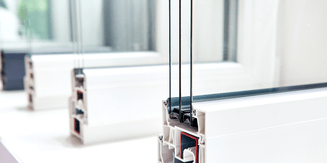Glass Alternatives for Windows with Plastics

Exploring Acrylic and Polycarbonate
Traditionally, glass has been the preferred material for windows. However, as technology advances, so do our options. Non-glass window solutions are gaining traction for their durability, impact resistance, and innovative designs.
In this article, we'll delve into the world of plastic window alternatives, specifically focusing on acrylic and polycarbonate materials. These two contenders offer unique advantages that challenge the conventional use of glass in windows.
The Rise of Plastic Window Alternatives
Acrylic Window Panels: A Crystal-Clear Contender
In the realm of plastic alternatives, acrylic stands out as a promising candidate. Imagine a material that offers exceptional clarity, almost resembling glass, but without fragility. Due to their optical clarity and impressive impact resistance, acrylic window panels have become a popular choice. This material allows light to pass through effortlessly, creating a vibrant and well-lit environment.
Polycarbonate Windows: Unparalleled Impact Resistance
For those seeking unparalleled impact resistance, polycarbonate windows are the answer. Think of polycarbonate as the superhero of window materials – it's incredibly tough and can withstand even the most extreme conditions. This makes polycarbonate windows a prime choice for areas prone to harsh weather or potential impacts.
Benefits of Acrylic and Polycarbonate Materials
Durability Beyond Compare
Both acrylic and polycarbonate excel in the durability department. They can withstand heavy blows, reducing the risk of breakage. Unlike traditional glass, which can shatter into dangerous shards upon impact, these plastic alternatives offer enhanced safety.
Lightweight and Easy Installation
While glass windows can be heavy and cumbersome, acrylic and polycarbonate materials are lightweight, making them easier to handle and install. This characteristic is particularly valuable for larger window installations.
Case Studies: Real-Life Applications
The Sky's the Limit: Acrylic in Skyscraper Windows
Acrylic's optical clarity and lightweight nature have found a home in the towering structures of our cities. Skyscraper windows crafted from acrylic provide breathtaking views while ensuring the safety of occupants.
Safety First: Polycarbonate in High-Risk Areas
Consider scenarios like schools or public spaces where safety is paramount. Polycarbonate windows have gained traction due to their ability to resist forced entry and potential vandalism.
Addressing Concerns and Common Misconceptions
"Do Plastic Windows Scratch Easily?"
Plastic materials have come a long way in terms of scratch resistance. While they may be more prone to scratches than glass, modern coatings and treatments can significantly mitigate this concern.
"Are Plastic Windows Prone to Fading?"
Acrylic and polycarbonate windows can be coated with UV-resistant layers to ensure their longevity and color retention.
Suggested Acrylic Products
- Optix(R) Acrylic - Crystal clear, impact- and weather-resistant, OPTIX is a continuously processed, high quality acrylic sheet. High molecular weight makes OPTIX ideal for almost any type of fabrication or glazing, while special UV stabilization protects the sheet from yellowing.
- Optix(R)- L Museum Grade - Maximum protection — Filters out 98% of damaging UV light. Blocks out harmful light that fades and damages exhibits while still allowing for brilliant illumination.
- Altuglas(TM) Clear white - Whether clear, opalescent, or pure white – ALTUGLAS™ Clear white acrylic sheets are a material of choice for numerous applications. Depending on the light transmission property and aesthetics needed.
Suggested Polycarbonate Materials
- Tuffack(R) UV - polycarbonate sheet is an enhanced UV-resistant product with exceptional weatherability and superior impact strength. Available in clear as well as a variety of colors, UV is the perfect choice for architectural applications where extended service life and resistance to color shift is required.
- Lexan(TM) UV Protected Sheet - This virtually unbreakable, transparent, polycarbonate materials under LEXAN™ sheet portfolio come with UV protection on one or both sides and provide remarkable clarity - even after many years of intense sunlight and weather extremes.
- Zelux(R) W - a window grade polycarbonate (PC) that is optically clear with excellent dimensional stability, good strength, and stiffness, offering service temperatures up to 250°F. Zelux® W is often used for structural applications when clarity and impact strength are essential, including: lenses, manifolds, sight glass, and machine guards.
Conclusion
The world of windows is undergoing a revolutionary transformation with the emergence of plastic alternatives. Acrylic and polycarbonate materials offer a compelling combination of durability, impact resistance, and environmental consciousness. As technology continues to advance, we can expect these materials to redefine our notion of what a window can be.
FAQs (Frequently Asked Questions)
1. Are acrylic and polycarbonate windows suitable for all climates?
These materials can handle different climates, but it's best to ask an expert before picking one.
2. Can I replace my existing glass windows with acrylic or polycarbonate panels?
Yes, many existing windows can be retrofitted with acrylic or polycarbonate panels. However, the installation process may vary depending on the type of window and its frame.
3. How do acrylic and polycarbonate windows compare in terms of cost?
Generally, acrylic is more affordable than polycarbonate. However, polycarbonate's exceptional impact resistance may justify the higher price for certain applications.
4. Are plastic windows less energy-efficient than glass?
New acrylic and polycarbonate windows have energy-saving features like low-E coatings to control indoor temperatures. These windows can help regulate indoor temperatures by using low-E coatings. Modern acrylic and polycarbonate windows have energy-efficient features like low-E coatings to control indoor temperatures. Modern acrylic and polycarbonate windows have energy-efficient features like low-E coatings to control indoor temperatures.
5. Can I use plastic windows for soundproofing purposes?
Plastic windows help with sound, but double or triple-pane glass windows are better for blocking noise.


